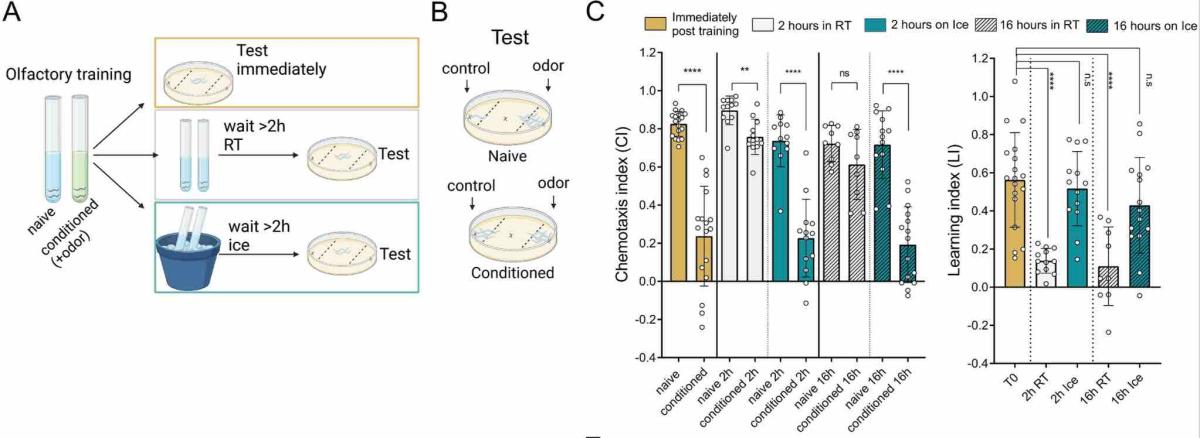記憶を凍結?:線虫を氷の上に置くと忘れなくなる
「記憶」がどのように合成され、どのように忘却されるのか、というのは、大きな謎です。4月になって、査読前のプレプリントサーバbioRxivにイスラエルのテルアビブ大学のチームから興味深い論文が掲示されています。この研究では、302 個のニューロンしかない単純な動物である線虫 (Caenorhabditis elegans) を用いて、氷上に線虫を置くとその記憶が保持されることを示しています。
Berliner,D.L. et al. (2024) A Tunable and Druggable Mechanism to Delay Forgetting of Olfactory Memories in C. elegans. bioRxiv
実験では、線虫にとっての嫌悪臭であるブタノンを利用し条件付けを行いました。通常、線虫は条件付け後2〜3時間で嗅覚記憶を忘れますが、驚くべきことに、氷上で飼育した線虫は学習した記憶を維持することができたのです。
氷の上に置かれた線虫はにおいに対する特定の記憶を少なくとも16時間(8倍)長く保持することがわかりました (ただし、24時間後には線虫は弱ってしまいます)。氷から室温に戻された後3時間で線虫は忘却したので、氷上に置くことで忘却が一時的に遅延するだけであり、記憶は定着するわけではありません。

しかし、記憶訓練の前に線虫を一晩冷やしておくと、いつものように臭いをすぐに忘れてしまいました。これは、低温に順応した線虫は耐寒性となり、忘却の遅延が起こらなくなるためと考えられます。
リチウムを投与されていない線虫は記憶を保持しません。ところが、リチウムを与えられた線虫は室温でも記憶を保持したのです。リチウム塩を与えられて氷の上に置かれた線虫は、リチウムを与えられなかった線虫と同じように記憶を保持していました。リチウムも耐寒性でない (氷上で忘却が遅延する) 線虫でのみ忘却を遅延させました。つまり、氷の上で観察される線虫の記憶の保持がリチウム塩でも起こり、氷とリチウムの効果の両者には共通点があるということです。
同様の結果が、AWCニューロンによって感知される別の2種類のにおい (ベンザルデヒドとペンタジオン) でも得られました。リチウムによる忘却の遅延には、AWC感覚ニューロンでのジアシルグリセロール経路のダウンレギュレーションが必須であると考えられます。神経活動記録によれば、記憶痕跡が下流のAIYインターニューロンにあるようです。RNAシーケンシング、突然変異体解析、薬理学的アッセイの結果、細胞膜の性質を調節することで、低温による忘却の遅延のオンとオフを切り替えることが明らかになりました。
このチームでは、現在、クマムシのような小さな動物やある種のカメなど、低温に耐えることができる他の生物でも同様の記憶現象が起こるかどうかを調査しているそうです。
低温やリチウムが脳に及ぼす影響、精神疾患への影響、さらには記憶の保存と消失の根本的なメカニズムを解明する手がかりになる研究かもしれません。
【合成生物学ポータル】 https://synbio.hatenablog.jp
【Twitter】 https://twitter.com/yamagatm3
更新の通知を受け取りましょう


























投稿したコメント